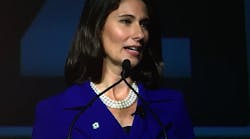How many hours of sleep did you get last night? Have you ever pulled an all-nighter, stayed up late or woken up early?
Deborah Hersman, president and CEO of National Safety Council (NSC), asked the audience similar questions during the opening session at the National Safety Congress in Indianapolis to demonstrate how fatigue affects the American workforce, and what it means for workplace safety.
“We as human beings are operating on our original operating systems,” she said. “Fatigue affects employees in every industry.
Hersman pointed out how people are cognizant about charging their cell phone batteries every night, but they often don’t pay attention to the amount of sleep they get, something that could lead to injury and lower performance on the job.
The theme, of this year’s National Safety Congress, which is aptly tied in with NASCAR based on event’s location, is “Racing to Zero: Safety that Works.” Hersman focused on reducing the number of injuries caused by worker fatigue and related it to the phrase.
“The ‘Race to Zero’ means we can’t just address obvious hazards,” she told attendees. “We have to address the human being and what is draining our batteries.”
Worker fatigue means more injuries and missed days. It also could lead to an increase in illness including heart disease and diabetes.
In addition, employees behind the wheel are at greater risk of being involved in a motor vehicle accident. A worker who gets just two fewer hours of sleep during the night is the equivalent of having three beers, which means they are driving impaired, she said.
“Good sleep can have an immediate impact on performance,” she said.
To combat workforce fatigue, Hersman suggested examining time of day at which an incident occurred and work-rest schedules when trying to identify a root cause.
Because the majority of workers take sleep for granted and pride themselves on being able to finish a task with less sleep, sleep disorders often go diagnosed, health costs go up and productivity goes down, she said.
“It looks like we all have to take time to refuel. Sleep is critical,” Hersman indicated. “Putting in more hours on the job does not guarantee better results.”
Because of this, managers and supervisors should attempt to minimize overnight shifts and double shifts. Workers should also be educated on sleep health and informed about healthy sleep habits. In addition, Hersman recommended screening for sleep disorders as well as supporting any subsequent treatments.
“Whether you’re running a marathon or flying a plane, you need to be prepared for your own race to zero,” she said, driving home the importance of a good night’s sleep.
